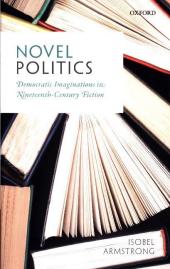 Neuerscheinungen 2017Stand: 2020-02-01 |
Schnellsuche
ISBN/Stichwort/Autor
|
Herderstraße 10
10625 Berlin
Tel.: 030 315 714 16
Fax 030 315 714 14
info@buchspektrum.de |

Isobel Armstrong
Novel Politics
Democratic Imaginations in Nineteenth-Century Fiction
2017. 298 S. 221 mm
Verlag/Jahr: OXFORD UNIVERSITY PRESS 2017
ISBN: 0-19-879372-3 (0198793723)
Neue ISBN: 978-0-19-879372-4 (9780198793724)
Preis und Lieferzeit: Bitte klicken
Novel Politics aims to change the current consensus of thinking about the nineteenth-century novel, which assumes that its default position is conservative and hegemonic. Isobel Armstrong creates a poetics of the novel that opens up its radical aspects, and treats the novel as a lived interrogation, experimental, and a source of social questioning.
Novel Politics aims to change the current consensus of thinking about the nineteenth-century novel. This assumes that the novel is structured by bourgeois ideology and morality, so that its default position is conservative and hegemonic. Such critique comes alike from Marxists, readers of nineteenth-century liberalism, and critics making claims for the working-class novel, and systematically under-reads democratic imaginations and social questioning innovels of the period.To undo such readings means evolving a new praxis of critical writing. Rather than addressing the explicitly political and deeply limited accounts of the machinery of franchise and ballot in texts, it is important to create a poetics of the novel that opens up its radical aspects. This can be done partly by taking a new look at some classic nineteenth-century political texts (Mill, De Tocqueville, Hegel), but centrally by exploring four claims: the novel is an open Inquiry (comparephilosophical Inquiries of the Enlightenment contemporary with the novel´s genesis), a lived interrogation, not a pre-formed political document; radical thinking requires radical formal experiment, creating generic and ideological disruption simultaneously and putting the so-called realist novel and its valuesunder pressure; the poetics of social and phenomenological space reveals an analysis of the dispossessed subject, not the bildung of success or overcoming; the presence of the aesthetic and art works in the novel is a constant source of social questioning. Among texts discussed, six novels of illegitimacy, from Jane Austen to Scott to George Eliot and George Moore, stand out because illegitimacy, with its challenge to social norms, is a test case for the novelist, and a growing point of the democratic imagination.
[Novel Politics] is an admirably ambitious book - building on Armstrong´s previous work such as The Radical Aesthetic (2000), but going beyond it; full of strong new readings; and clearly animated by the desire to make literature, and the study of literature, work for justice. Dominic Rainsford, Dickens Quarterly
Isobel Armstrong´s career has been characterised by changes of location and the pleasure of different intellectual contexts. Beginning at University College London, she taught English and Victorian Studies at Leicester and Southampton, latterly returning to London University and to Birkbeck College. She has been Visiting Professor at Harvard, Johns Hopkins, and Princeton, and teaches on the Middlebury Bread Loaf MA. Armstrong is a Fellow of the British Academy andelected to the American Academy. Her book Victorian Glassworlds(OUP, 2008) won the MLA´s James Russell Lowell Prize in 2009.


